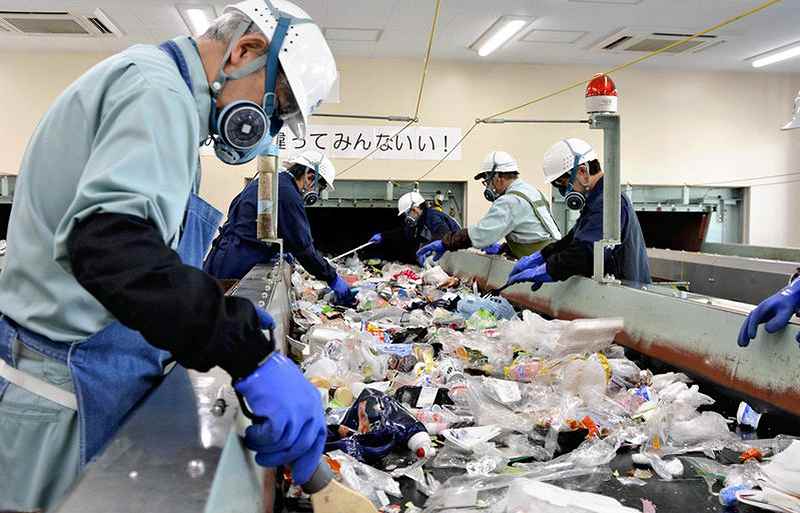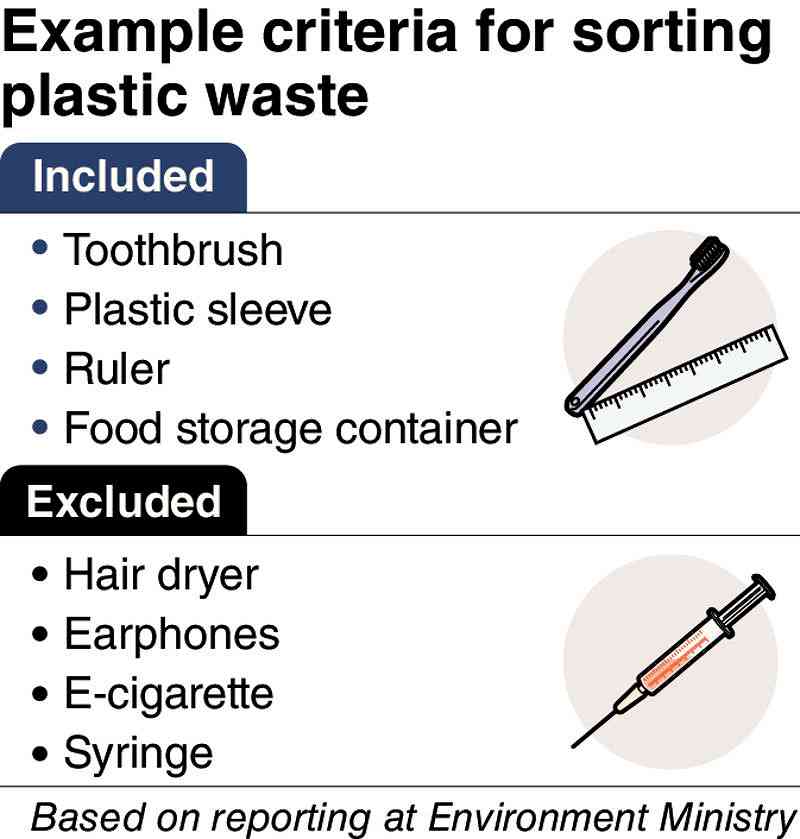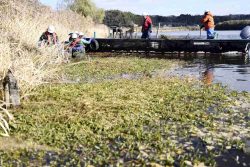
Workers sort out plastic waste by hand in Tokyo on Dec. 1.
December 10, 2021
Municipalities have been slow to sort plastic waste, with only 72 city governments or related entities — fewer than 10% — either doing so or planning to do so within three years after the Plastic Resource Circulation Law takes effect in April next year, according an Environment Ministry survey.
The law was enacted in June with the aim of reducing and recycling plastic waste to cope with climate change and marine plastic pollution. The law requires local governments to sort waste and urges businesses to reduce their use of plastic products.
For household waste, plastic containers such as food trays have been collected separately under the Containers and Packaging Recycling Law, and the new law also covers a wider range of plastic products, such as washbasins.

Plastic products are currently treated as burnable or incombustible waste in many municipalities. According to a ministry survey conducted in July and August on municipalities and wide-area administrative unions nationwide, only 29 out of 867 such entities — just 3% — said they were already sorting plastic waste, while another 14 said they would do so within a year after the law comes into force and 29 said they would do so within three years. In all, only 72 entities either had introduced or will introduce plastic waste sorting within three years.
Behind the slow pace, the ministry said, is concern over the financial burden and a lack of awareness among residents.
Under the new law, municipalities will be responsible for all disposal costs, including strengthening the collection system and building refuse treatment facilities. At the time of the law’s enactment, both chambers of the Diet passed an additional resolution calling for the national government to support municipalities financially. As a result, the ministry is considering subsidizing the cost as early as next fiscal year.
Although which items to classify as plastic waste are left to municipalities, the ministry plans to announce a list by the end of this year in response to requests from municipalities to set some criteria.
Toothbrushes and clear file folders will be included in the list, while electronic devices such as earphones and medical waste such as syringes will be excluded.
The Plastic Waste Management Institute said that of the 8.5 million tons of plastic waste produced in 2019, only 2.13 million tons, or 25%, was recycled, while the rest was incinerated or landfilled.
Top Articles in Science & Nature
-

Japan Institute to Use Domestic Commercial Optical Lattice Clock to Set Japan Standard Time
-

Japan to Face Shortfall of 3.39 Million Workers in AI, Robotics in 2040; Clerical Workers Seen to Be in Surplus
-

Record 700 Startups to Gather at SusHi Tech Tokyo in April; Event Will Center on Themes Like Artificial Intelligence and Robotics
-

iPS Treatments Pass Key Milestone, but Broader Applications Far from Guaranteed
-

iPS Cell Products for Parkinson’s, Heart Disease OK’d for Commercialization by Japan Health Ministry Panel
JN ACCESS RANKING
-

Japan PM Takaichi’s Cabinet Resigns en Masse
-

Japan Institute to Use Domestic Commercial Optical Lattice Clock to Set Japan Standard Time
-

Israeli Ambassador to Japan Speaks about Japan’s Role in the Reconstruction of Gaza
-

Man Infected with Measles Reportedly Dined at Restaurant in Tokyo Station
-

Videos Plagiarized, Reposted with False Subtitles Claiming ‘Ryukyu Belongs to China’; Anti-China False Information Also Posted in Japan























